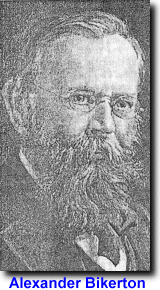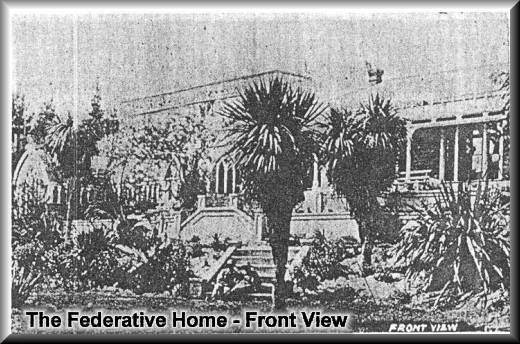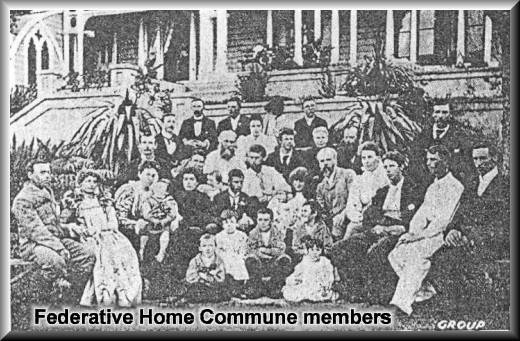 The later half of last century saw some major advances in science and technology. There was a belief that science would solve many of the social problems of humanity, and would sweep away many repressive and superstitious institutions. One person who shared this belief was Alexander Bikerton. He arrived in New Zealand in 1873 to take up his appointment as Professor of Chemistry at Canterbury College, the forerunner of todays university. He immediately began a course of popular lectures which attracted hundreds of people. He was a born actor and an exceptional teacher. Public lectures at that time were regarded as popular entertainment. Bikerton was a pioneer in science education, and champion of original investigations. He regularly demonstrated Nikola Tesla's experiments. Tesla was a pioneer in the development of alternating current when General Electric and Thomas Edison were promoting direct current. He remains a rather obscure scientist, principally because many of his inventions would have destroyed the profitability of many companies that are now multi-nationals. When he died the United States government impounded the entire contents of his safe, only they know what it contained.
The later half of last century saw some major advances in science and technology. There was a belief that science would solve many of the social problems of humanity, and would sweep away many repressive and superstitious institutions. One person who shared this belief was Alexander Bikerton. He arrived in New Zealand in 1873 to take up his appointment as Professor of Chemistry at Canterbury College, the forerunner of todays university. He immediately began a course of popular lectures which attracted hundreds of people. He was a born actor and an exceptional teacher. Public lectures at that time were regarded as popular entertainment. Bikerton was a pioneer in science education, and champion of original investigations. He regularly demonstrated Nikola Tesla's experiments. Tesla was a pioneer in the development of alternating current when General Electric and Thomas Edison were promoting direct current. He remains a rather obscure scientist, principally because many of his inventions would have destroyed the profitability of many companies that are now multi-nationals. When he died the United States government impounded the entire contents of his safe, only they know what it contained.
Within a short period of time Bikerton became unpopular with the Christchurch establishment, dominated as it was by the Church of England. During the course of conversation the Bishop urged him to study the Bible. Later, when asked what he thought of it, he replied "Really excellent. I have decided to put myself down as a Christian at the next census." "Good heavens!" exclaimed the clergyman, "What religion did you state at the last census?" "Church of England", replied Bikerton. Bikerton also developed a scientific theory which he called partial impact. This he believed explained the birth of stars. However it also directly contradicted the teachings of the Book of Genesis, and of course those of the Bishop. He regarded himself as a state socialist and supporter of the single tax movement. Nevertheless by the late 1880's he had become convinced that genuine communism would be easier to attain than any steps taken towards it. In a letter to the Lyttelton Times he outlines his libertarian communist views.
In 1893 Bikerton became a member of the Christchurch Workingmen's Society and soon afterwards President of the Tailoresses and Presses Union. He was also one of the founders of the Kingsley Club. The Club had a membership of 400 and organised benefit dances concerts and lectures on a weekly basis. In 1898, along with others he established the Federative Home at Wainoni. He had purchased the property some years before. Wainoni was to be an experiment in communal living. By autumn 1899 the Federative Home was well established with about thirty members. All domestic work was done co-operatively and most of the members had outside jobs. However the community did support a few industries such as a fireworks factory. Bikerton was also one of the founders of the Socialist Party. Many socials and picnics were held in support of the party at Wainoni. The Federated home itself covered several acres of garden. At the centre was the main house built from materials recovered from the Christchurch Exhibition of 1882. From contemporary accounts it was very impressive. A report from the Canterbury Times of 1898 recounts.
In an interview in the Lyttelton Times in 1902 Bikerton comments.

The home boasted a large library, a gymnasium, tennis court and several other social amenities. In all it appears that the members lived an idyllic existence.
In 1900 Bikerton returned briefly to England, there he met Kropotkin several times and Malatesta. He criticised the anarchists for not pursuing, "sound and logical methods" to achieve anarchism. By this stage Kropotkin was not an enthusiastic exponent of experimental colonies. Most had been dismal failures. Bikerton may have renewed his friendship with Paul Robin. Robin had travelled to New Zealand in 1898 arriving in Auckland. We don't know if they met personally but almost certainly exchanged letters. Robin was very influential in libertarian educationalist circles in France. Angus McLaren's book "Sexuality and Social Order" briefly mentions Robin's visit to Aotearoa and his friendship with Bikerton Robin wrote in "Regeneration" (April 1908)
Emma Goldman mentions Robin in her autobiography, "Living My Life"
Emma Goldman was in Paris where she attended the Neo-Malthusian Congress. She met Robin and several other delegates. Her friend was Victor Dave an anarchist member of the First International and friend of Bakunin. The congress met in secret and every session was in a different place. We don't know if Bikerton attended this conference. Perhaps he did.
Bikerton returned to New Zealand, but by 1903 the Federative Home began to falter. He estimated that the place would need at least one hundred members to prosper. The numbers rarely rose above thirty. Many of the members would not co-operate in the running of the place and Wainoni became for many a free boarding house. After the home eventually failed Bikerton turned the property into an amusement park. By this stage he had been dismissed from Canterbury College. The amusement park also failed. In 1910 he once again returned to England leaving his family behind. He tried to gain recognition for his scientific theory of partial impact, from the scientific community. No one was interested. He never returned to Aotearoa, and died in England, at the age of 81 in 1928. His last years were spent in virtual poverty, regarded as a crank and eccentric. Bikerton was a great scientist, a person far in advance of his times.
